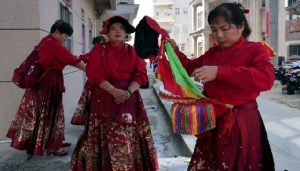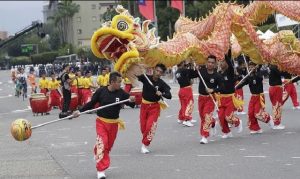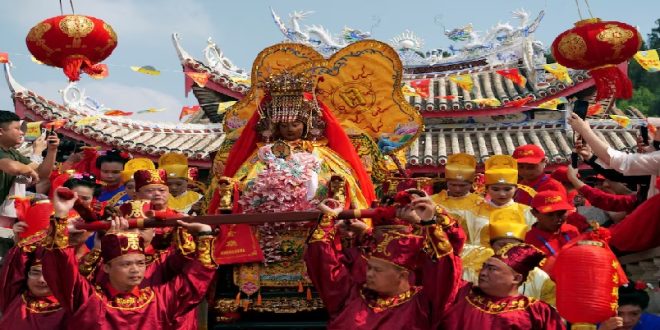13-10-2024
MEIZHOU, CHINA: Over a thousand Taiwanese pilgrims flocked to southeast China’s Fujian province this week for a religious festival, a rare instance of cross-strait cultural exchanges that threatens to be overshadowed by political tensions.
 On Meizhou Island, home to a cluster of rural fishing villages, the deafening roar of firecrackers and gongs accompanied devotees of the sea goddess Mazu, a folk deity worshipped by millions in Taiwan and across southern China’s coastal communities. The island, where devotees say the goddess was born, is the most important Mazu religious centre.
On Meizhou Island, home to a cluster of rural fishing villages, the deafening roar of firecrackers and gongs accompanied devotees of the sea goddess Mazu, a folk deity worshipped by millions in Taiwan and across southern China’s coastal communities. The island, where devotees say the goddess was born, is the most important Mazu religious centre.
Mazu temples on both sides of the Taiwan Strait share close cultural ties but Taiwan officials say they think the Chinese Communist Party has been seeking to influence Taiwanese believers with subsidized visits to China and religious exchanges.
Locals dressed in colorful ceremonial robes, accompanied by drum troupes and fireworks, paraded statues of Mazu around temples on the island. The goddess is believed to protect sailors and fishermen.
Taiwan’s President Lai Ching-te angered Beijing on Thursday, reiterating that China has no right to represent Taiwan. Taiwanese and Western officials have warned China could stage military drills in response.
China has ramped up the frequency of war games around Taiwan in recent months, launching large-scale “punishment” drills in May after Lai’s inauguration.
Beijing claims democratically governed Taiwan as its own territory, a view Lai and his government reject. China advocates “peaceful unification” but has not renounced the possibility of annexing Taiwan by force.
China’s commerce ministry said on Saturday it was considering further tariffs on Taiwanese goods. Temple organizers tout the Mazu event as a chance to promote cross-strait unity. Banners read “Let peace spread across both sides of the strait” and urged both sides to worship together. A local official gave a speech praising Meizhou as a “model zone for cross-strait integrated development”.
China which suspended most tourism to Taiwan in 2019, citing cross-strait tensions last month allowed some citizens to travel to the Taiwanese island of Kinmen, just 200 km (120 miles) from China. Tourism both ways has not recovered to pre-COVID levels, and Taipei has issued travel warnings after several Taiwanese were detained or questioned at the Chinese border in recent years.
 “Cross-strait relations are quite tense now, but I hope everyone can get along peacefully and increase mutual visits to prevent misunderstandings,” said Chen Ping-tsun, a retiree from Chiayi city in southwestern Taiwan.
“Cross-strait relations are quite tense now, but I hope everyone can get along peacefully and increase mutual visits to prevent misunderstandings,” said Chen Ping-tsun, a retiree from Chiayi city in southwestern Taiwan.
Chinese officials and Taiwanese festivalgoers hope more people-to-people exchanges can ease political tensions.
“We are only ordinary folks. When they play politics, frankly speaking, it’s a struggle between powers,” said Rita Bai, a part-time university lecturer from Beigang Township in Yunlin County in western Taiwan but “we care more about personal ties and cultural exchanges.”
In December 2021, the Chinese Communist Party (CCP) suggested to ramp up exchanges with folk religious groups in rural Taiwan in an attempt to manipulate political opinion in Beijing’s favor ahead of elections next month, according to Taiwan government documents and security officials.
Religious trips across the Taiwan Strait increased this year after the end of China’s years-long zero COVID policy, according to a review of the websites of the Chinese government, CCP-run religious groups and state media. Dozens of the trips were focused on worship of Mazu, a sea goddess whose 10 million Taiwanese worshippers make her the island’s most popular deity. (Int’l Monitoring Desk)
 Pressmediaofindia
Pressmediaofindia




